Han cadre shows his love for Tibet by building yak museum
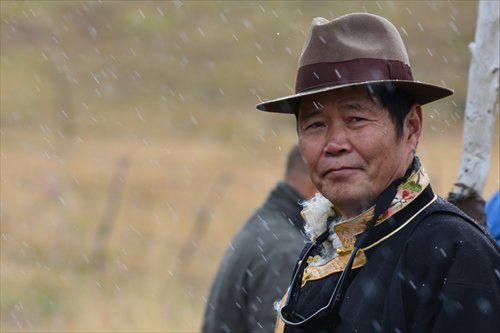
Wu Yuchu Photo: Courtesy of Wu Yuchu
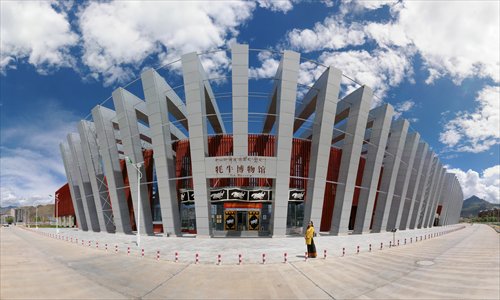
A visitor stands outside the Yak Museum. Photo: Courtesy of Wu Yuchu
Unlike many other non-native officials in Southwest China's Tibet Autonomous Region, who usually head east when they retire, Wu Yuchu chose to do the opposite.
After working in Beijing for nearly two decades, he quit his posts as Party committee secretary and president of the State-owned Beijing Publishing Group in 2011 and returned to Tibet, a place where he had worked for 16 years in his younger days as a cadre supporting Tibet.
There, he resolved to realize his dream of building a yak museum. After three years' effort, the dream became reality. Located in Lhasa's Liuwu New District on the south bank of the Lhasa River, the museum has already been visited 80,000 times since opening in May 2014, Wu said.
"In some people's minds, Tibetan culture is all about Tibetan Buddhism. That's wrong. Tibetan culture is much more than that," Wu told the Global Times in a recent interview. "In the last few thousand years, Tibetan clothing, food, burning, shelter, transport, farming and even politics, business, entertainment and medicine have been closely connected to the yak."
"It has even affected the spiritual character of the Tibetans. On the back of the yak, there is the history and culture of the plateau," he said, explaining his motivation for building a yak museum.
Thanks to his dedication, his Tibetan friends have given him the nickname Yakbo, which means old yak in Tibetan.
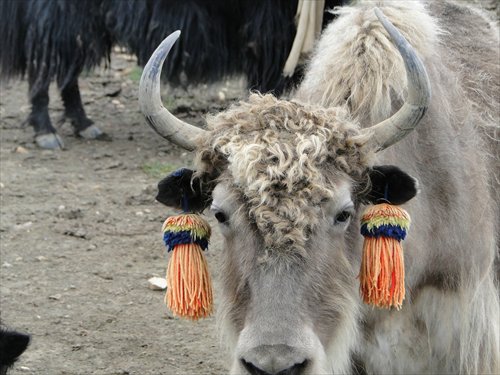
Photo: Courtesy of Wu Yuchu
Close shave
Hailing from Duchang county in East China's Jiangxi Province, 22-year-old Wu went to Tibet in 1976 after graduating from Jiangxi Normal University. Responding to the call of the central government to go to border areas and places where they were most needed, he became one of about 5,000 worker-peasant-soldier students who went to Tibet in the 1970s.
He was dispatched to a pastoral township in Jiali county, Naqu prefecture in northern Tibet, becoming a clerk and traveling to various villages to document the situation of local political studies and productivity.
As the only Han in a township 5,000 meters above sea level, he started to learn about yaks, an animal closely related to the daily lives of the locals. He lived in a house where yak dung, which the herdsmen used for fuel, took up nearly half of the space. One experience in winter the following year left him with a deep affection for the animal.
Due to a snowstorm, the truck he was traveling in became stuck along with about 20 other vehicles on the road between Naqu and Jiali. Attempts to get out by foot were futile, as the temperature was -30 C and the snow was four meters deep. Bitterly cold and hungry, the 50 or so people found an adobe house used by road repair personnel and crammed inside.
After receiving a message through a military radio, Jiali county authorities mobilized officials and staff to make pancakes that night and sent a jeep to deliver the food.
When the jeep couldn't move any further, they used horses. However, the horses also got stuck in the deep snow. Finally, a nearby town sent a group of yaks, which carried the pancakes, opened up the road and reached them after Wu and the others had been trapped for four nights.
"When we got the pancakes, many of us cried. It was the yaks that had saved our lives," Wu recalled.
In 1984, Wu was appointed director of the cultural bureau of Naqu prefecture. In 1988 he took a post in the region's publicity department in Lhasa. During his years of interacting with local residents, he formed a love for the land and its people, and made many Tibetan friends.
"I've found that the characteristics of the yak - honesty, faithfulness, compassion, bravery and diligence - are just the qualities of our Tibetan compatriots," he said.
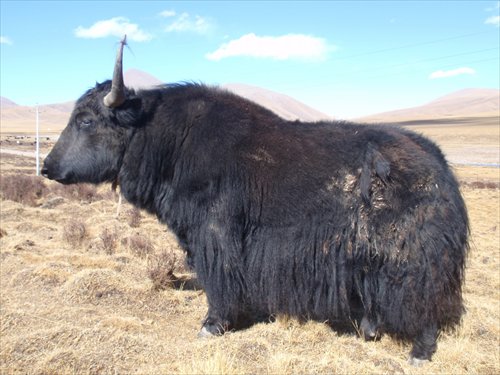
A yak beside the Qinghai Lake Photo: Courtesy of Wu Yuchu
Realizing a dream
In 1992, he was transferred to the Beijing municipal publicity department. But he never forgot about Tibet.
While sleeping on a winter's day in 2010, he had a dream about setting up a yak museum. After talking about this idea with many of his Tibetan friends , he made his decision. In 2011, he quit his job and started to dedicate himself to realizing his dream.
In the following three years, he traveled around Tibet to carry out field investigations and collect yak-related stories and objects.
When cars and agricultural machines entered the lives of nomadic Tibetan families in the 1990s, the tradition of using yaks for transportation and farming began to fade. "Tibetans are stepping into modernization, and their relationship with the yak is also changing," Wu said.
In 2014, when he visited the town where he worked decades ago, he was amazed by the changes. The herdsmen now all ride motorcycles and use mobile phones.
"It fills me with joy to see the progress, but we shouldn't lose those historical memories," he said.
While hearing the news about a yak museum, many Tibetans approached Wu and donated their property and collections, such as yak leather products, yak paintings, shields made from yak wool and utensils made of yak horns.
One herdsman mobilized all his family members to weave a tent made of yak wool and drove for three days just to give it to Wu.
According to Wu, of the 2,000 displays in the museum, half of them were donated by locals.
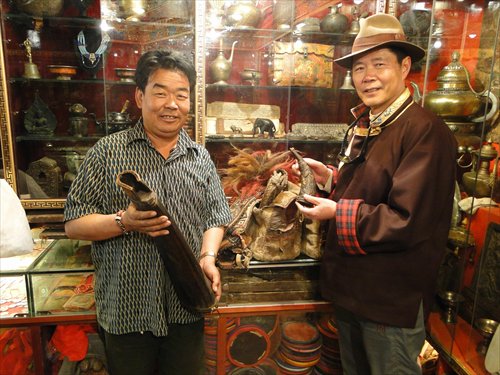
An antiques dealer donates his collections to Wu Yuchu. Photo: Courtesy of Wu Yuchu
"The museum is not intended to tell just the stories and roles of the yak, but also the story of yaks and people. It's actually a museum of anthropology. The yak is the carrier," Wu said.
The idea to build a museum also received strong support from the Beijing municipal government, which paid 110 million yuan ($16.9 million) for the museum's construction.
After its completion, the museum was handed over to the government of Lhasa, Wu said.
His dream has now come true, but the 61-year-old Wu still lives in Lhasa. Every morning, he gets up early and strolls along the Lhasa River and reads aloud short stories in Tibetan, one method he insists on persevering in to practice the language.
"I have been learning the language, but my progress has been poor. I believe the language is the basis for us to know, love and construct Tibet," Wu said. "Many Tibetan officials can speak Putonghua, but few of their Han counterparts can speak Tibetan, which is a great shame."
Next, he hopes to get the museum to hold temporary exhibitions in other parts of China and the world. "I hope more outsiders can know what Tibet and its people are truly like," he said.
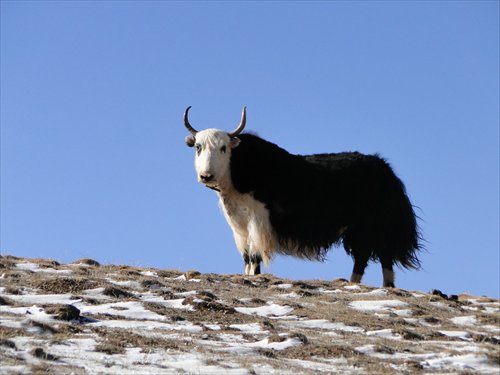
A yak from Jiulong county, Sichuan Province Photo: Courtesy of Wu Yuchu
Newspaper headline: Yakbo of the plateau